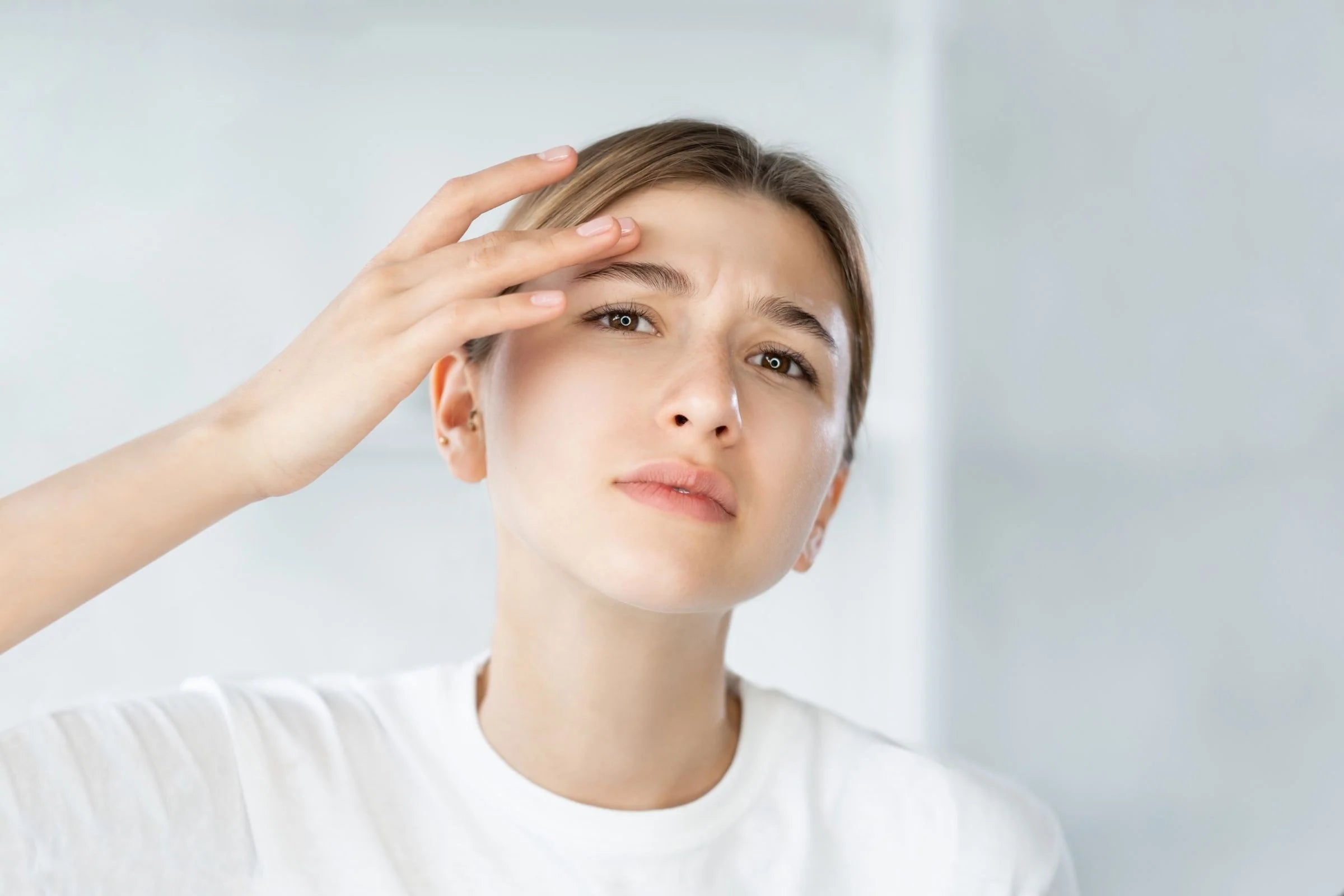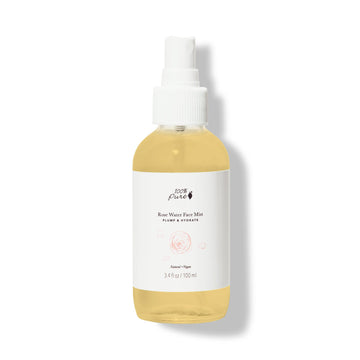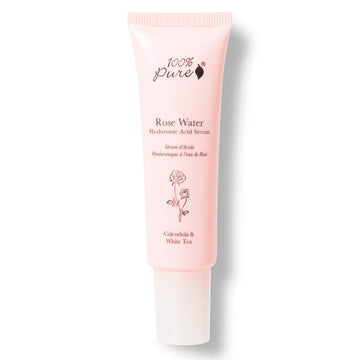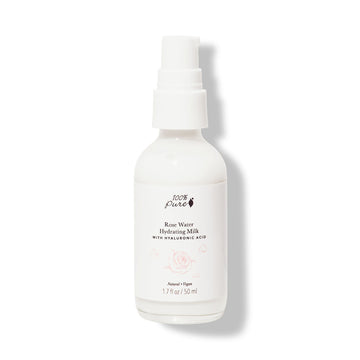Discover the truth about hypoallergenic skincare, how to choose the best products, and tips to avoid irritation or allergies.
Posted on January 20, 2025 Written by: 100% PURE®
Finding products that work well with sensitive skin can be like walking through a minefield. One bad choice could ignite a host of skin problems. You find solace in snatching skincare products boasting the label “hypoallergenic,” as the term sounds like a guarantee of safety, only to discover another mine misstep.
With the term being used for decades in beauty and skincare, it’s no wonder we associate "hypoallergenic" products with being safer and not causing allergic reactions. Here's the catch: Even though these products seem to fly off store shelves, there's a bit of confusion over what the term hypoallergenic really means.
Keep reading to learn more about hypoallergenic skincare, who can benefit from it, and why it’s important to understand its limitations. Plus, we’ll cover the right products for sensitive or allergy-prone skin to feel like they’ve struck gold!
What Does Hypoallergenic Skincare Mean?
Now, more than ever, we are becoming label readers – especially in the skincare realm. With the growing demand for long-lasting beauty while upholding factors of internal well-being, mindful skincare, and ethical standards, labels can make or break a product. Naturally, if we’re doting on a skin product boasting the term “hypoallergenic,” it’s coming home. Do not pass go, do not collect – quite yet.
We often hear the phrase “hypoallergenic” thrown around in skincare, but what exactly does it mean?
Hypoallergenic refers to products that are less likely to cause allergic reactions. The term combines "hypo," meaning "less than," with "allergenic," which relates to allergens—substances that can cause allergic reactions.
As a consumer driven by its literal meaning, it could easily be understood that hypoallergenic products won’t cause reactions. Unfortunately, that is incorrect. Hypoallergenic skincare really means that the products won’t cause an allergic response in most people.
According to the FDA, hypoallergenic cosmetics are “...products that manufacturers claim produce fewer allergic reactions than other cosmetic products. Consumers with hypersensitive skin, and even those with ‘normal’ skin, may be led to believe that these products will be gentler to their skin than non-hypoallergenic cosmetics.”
However, aside from this explanation, there is no official definition for the word. Additionally, the FDA does not have any regulatory authority over cosmetics that are labeled as such.
Consequently, “hypoallergenic” is considered a marketing claim since it’s not defined or governed. That means it’s ultimately up to each company to determine what it means within the context of their products. Since no federal standards govern how brands use the term hypoallergenic, people with sensitive skin or allergies must be wary of the potential effects of these products.
Whether you have sensitive skin, all skin types should avoid common allergens that hypoallergenic products aim to minimize, such as fragrances, preservatives, and dyes. While preservatives, particularly parabens, have been linked to potential health concerns, they are likely to irritate sensitive skin, causing redness, itching, or allergic reactions. Fragrances and dyes do the same in addition to disrupting the skin's natural barrier function, potentially leading to further skin issues like dryness and inflammation.
It’s also crucial to keep in mind that even products labeled as hypoallergenic may contain common allergens. It's essential to remember that "hypoallergenic" does not mean "allergen-free." While these products are less likely to cause a reaction, they can still contain ingredients that might affect some skin types. Always check ingredient labels.

Who Should Use Hypoallergenic Products?
If you have sensitive or allergy-prone skin, you’re well-versed in the many emotional and environmental factors that affect this temperamental skin type. Your decisive dermis seems to agree it doesn’t like anything and throws temper tantrums over every skin product.
It’s frustrating trying to cope with skin that behaves like a toddler, not to mention if you have a heightened sensitivity due to conditions such as eczema or rosacea. If you’re a seasoned, sensitive-skin veteran, you could benefit from most hypoallergenic skincare. That’s right! If you fall into one of the following categories, hypoallergenic options could nip that skin testy behavior!
Sensitive skin
If your skin frequently reacts to different products, that could be a big indicator of sensitive skin. If so, you probably notice that exfoliants, fragrances, detergents, and dyes cause your skin to react, especially if they are not natural ingredients.
You may notice that many products can cause itchiness, dryness, or redness. This can also cause red bumps, blushing and flushing, or red dilated blood vessels. Some also experience redness, dry patches, and tightness of the skin. Another indicator of sensitive skin is if redness appears shortly after applying gentle pressure to the skin.
Prone to eczema or allergies
People with eczema or allergies may experience dry skin, itchiness, rashes, and blisters. Eczema can cause dry, cracked skin, especially on the face, neck, hands, wrists, elbows, knees, ankles, and feet. Other symptoms of eczema include a rash that varies in color depending on your skin tone, small blisters, especially on the fingers, toes, and palms, darker patches of skin, especially around the eyes, and thickened skin.
Hives are a common skin symptom of allergic reactions. Hives appear as groupings of red, raised bumps on your skin that itch. Other symptoms of skin allergies include itching and redness, especially in areas that have been in contact with an allergen, and skin swelling. The skin may feel tight, especially in severe allergic reactions.
Have compromised skin barriers
If you have chronic wounds or conditions like rosacea, you likely have a compromised skin barrier. Reactions to skincare products can cause different symptoms, including skin irritation like redness or itchiness, skin sensitivities to certain products, allergens, or irritants, inflammation, rough patches or discoloration, or breakouts.
Continued use of skincare products with harsh chemical surfactants, detergents, dyes, and fragrances can not only inflame sensitive or allergy-prone skin, but they can sensitize it. Repeated exposure to allergens can increase sensitivities over time, making hypoallergenic products a good preventative choice for everyone.
While there are a variety of factors that can cause skin sensitivities and irritation, there’s an equal amount of hypoallergenic skincare options that can soothe and protect skin. The 100% PURE Rose Water Face Mist is a fragrance-free, gentle toner perfect for soothing sensitive or allergy-prone skin. It features replenishing rose hydrosol to balance pH, reduce redness, and gently moisturize skin.
How to Tell If You’re Allergic to a Skincare Product
It’s daunting enough choosing the right skincare products to avoid a minefield of skin irritations. Now, we need to avoid the trip-wire of products that set off skin irritations versus skincare allergies. Since the two skin dangers seem similar, it’s important to become familiar with the symptoms of these two distinct reactions.
When a certain skincare ingredient irritates the skin, known as irritant contact dermatitis, it affects the skin and not the immune system. Symptoms of skin irritation include burning, stinging, itching, swelling, and redness in the area where the product was applied. If your skin is dry or injured, it loses some of its natural barrier protection against irritants. This means reactions can be harsher or happen more easily.
A skin allergic reaction or allergic contact dermatitis does involve the immune system – and is a true allergy. It occurs when your immune system reacts to a topical ingredient and is typically more severe than irritant contact dermatitis. Common signs of a skincare allergy are redness, itching, swelling, burning, blisters, or hives.
An allergic reaction to a skin product can affect anyone—some people have sensitive skin, while some have an inherent allergy to certain substances. Certain substances are also more allergenic than the rest. Take parabens: These are known allergens, which is why many product labels mention (or should) that they are “paraben-free.”
It’s important to note that allergic reactions can be delayed and might not occur immediately after product use. That’s why performing a Repeated Open Application Test (ROAT) is a crucial step before incorporating any new skincare product into your routine. It can help you determine whether your skin will react negatively to it. Here's a simple guide on how to do it:
#1. Select a small, discreet patch of skin. The inner forearm works as a good spot.
#2. Apply a small amount of the product to the inner arm daily for 2–4 weeks.
#3. Monitor the patch for any signs of redness, itching, burning, or swelling.
#4. If redness, scaling, or itching appears, immediately discontinue the ROAT test and consult a dermatologist.
As we’ve been discussing, skincare choices are very important for those with sensitive or allergy-prone skin. At 100% PURE, we formulate hypoallergenic skincare products that soothe and protect the delicate dermis without triggering irritation. The 100% PURE Rose Water Hyaluronic Acid Serum is an example of a gentle formula that’s designed to rejuvenate sensitive skin without triggering irritation. The lightweight gel texture instantly quenches dry skin, while chamomile and calendula extract calm and soothe for a peaceful glow.

What to Look for When Shopping for Hypoallergenic Skincare
Remember earlier when we mentioned shopping for skincare can seem like walking through a minefield, especially for sensitive skin? Now that we have cleared up some misconceptions over the term “hypoallergenic”, hopefully shopping for hypoallergenic skincare will be more of a walk in the park.
Let’s check out some key features to prioritize when shopping:
#1. Labels like fragrance-free (not “unscented”)
Fragrance-free skincare products do not contain fragrance materials or masking scents, while unscented products may contain chemicals that neutralize or mask the odors of other ingredients. Strong fragrances can be an irritant for sensitive skin. Synthetic fragrances are often irritating, but even essential oils are triggers for skin sensitivity. More on essential oils below!
#2. Products free from dyes, parabens, and common preservatives (e.g., methylisothiazolinone)
As we discussed earlier, sensitive and allergy-prone skin needs to steer clear of skin irritants like fragrances, dyes, and preservatives like parabens. Studies show that parabens artificially mimic estrogens in the body, leading to a host of topical and internal problems. For sensitive skin types, parabens can also worsen eczema, psoriasis, and contact dermatitis. Avoid the preservative menthoxypropanediol, which is a synthetic version of menthol used to give skincare products a minty fresh feel but has been linked to many allergic reactions.
#3. Avoid essential oils or plant-based products with sensitizers like hydroperoxide or linalool
Avoid skin products with sensitizers like hydroperoxide or linalool. Hydroperoxides of linalool are a type of oxidation product that forms when linalool is exposed to oxygen. Linalool is a fragrance chemical found in many skincare products. They can cause contact allergies, such as itching, redness, and inflammation, and are a common cause of allergic contact dermatitis.
A crucial key when shopping for hypoallergenic skincare is to prioritize that ingredient transparency is more important than the hypoallergenic label itself. At 100% PURE, we emphasize transparency in our ingredient sourcing, partnering with suppliers who share our vision of sustainability and ethical responsibility. Our refusal to compromise on quality ensures that every product we offer is not only effective but also genuinely beneficial for your skin and overall well-being.
Speaking of products beneficial for sensitive skin, the 100% PURE Rose Water Hydrating Milk is a lightweight moisturizer free from synthetic fragrances and designed to hydrate without irritation. This fast-absorbing moisturizer leaves dry skin feeling petal-soft. Rose hydrosol and hyaluronic acid ensure skin feels instantly hydrated with every application.
FAQs: Understanding Hypoallergenic Skincare
Does hypoallergenic mean allergen-free?
No, "hypoallergenic" does not mean no allergies. Hypoallergenic refers to products that are less likely to cause allergic reactions. As a consumer driven by its literal meaning, it could easily be understood that hypoallergenic products won’t cause reactions. Unfortunately, that is incorrect. Hypoallergenic skincare really means that the products won’t cause an allergic response in most people.
How can I tell if I have sensitive or sensitized skin?
Common signs of sensitive skin include redness, stinging, dryness, or itchiness after using skincare products or exposure to environmental changes. Sensitized skin, on the other hand, means that continued use of skincare products with harsh chemical surfactants, detergents, dyes, and fragrances can not only inflame sensitive or allergy-prone skin, but they can sensitize it. Repeated exposure to allergens can increase sensitivities over time, making hypoallergenic products a good preventative choice for everyone.
What ingredients are beneficial for sensitive skin?
The following ingredients can help soothe and protect sensitive skin:
Hyaluronic acid: Provides hydration without irritation.
Ceramides: Strengthen the skin barrier.
Aloe vera: Naturally soothing and anti-inflammatory.
Colloidal oatmeal: Calms redness and itching.
Niacinamide (Vitamin B3): Reduces redness and boosts skin barrier repair.
Centella asiatica (Cica): Known for its healing and soothing properties.
Panthenol (Provitamin B5): Moisturizing and anti-inflammatory.
What’s the difference between fragrance-free and unscented?
The differences between fragrance-free and unscented are that fragrance-free skincare products do not contain fragrance materials or masking scents. Unscented products may contain chemicals that neutralize or mask the odors of other ingredients. Any fragrance or masking scent can be an irritant for sensitive and allergy-prone skin types.
Can essential oils cause skin allergies?
Yes, essential oils can cause skin allergies. The most common allergic reaction to an essential oil is contact dermatitis — an itchy, red rash on your skin typically where the oil has been applied. In some cases, the rash may also blister or peel. The reaction may not always be immediate, you may not develop symptoms for several hours, or even days.
Conclusion
The term "hypoallergenic" is frequently seen on skincare labels, but its meaning is often misunderstood. "Hypoallergenic" literally means below (hypo) normal (allergenic). In the context of skincare, it suggests that the product is less likely to cause allergic reactions compared to others.
However, it's essential to understand that hypoallergenic skincare can reduce allergy risks but isn’t foolproof. It doesn't guarantee the product will not cause an allergic reaction at all. Reactions can vary from person to person, depending on skin type, sensitivities, and the specific allergens that an individual may react to.
Therefore, a crucial key when shopping for hypoallergenic skincare is to prioritize that ingredient transparency is more important than the hypoallergenic label itself. At 100% PURE, we emphasize transparency in our ingredient sourcing, partnering with suppliers who share our vision of sustainability and ethical responsibility. Our refusal to compromise on quality ensures that every product we offer is not only effective but also genuinely beneficial for your skin and overall well-being.
Moreover, another priority for sensitive or allergy-prone skin types before using a hypoallergenic skincare product is to perform a Repeated Open Application Test (ROAT). This is a crucial step before incorporating any new skincare product into your routine. It can help you determine whether your skin will react negatively to it. You’ll want to apply a small amount of the product to the inner arm daily for 2–4 weeks. If redness, scaling, or itching appears, immediately discontinue the ROAT test and consult a dermatologist for persistent concerns or to identify specific allergens.
We encourage our readers to explore 100% PURE’s clean and gentle skincare line for effective options tailored to sensitive or allergy-prone skin. This will help you to navigate hypoallergenic skincare with confidence and put you on a route minefield-free and more like a blissful skin walk in the park.
- Tags: January-2025
We carefully hand-select products based on strict purity standards, and only recommend products we feel meet this criteria. 100% PURE™ may earn a small commission for products purchased through affiliate links.
The information in this article is for educational use, and not intended to substitute professional medical advice, diagnosis, or treatment and should not be used as such.














